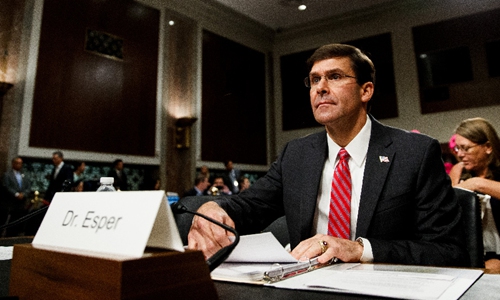HOME >> OPINION
US exit from Africa may worsen situation
By Donglona Adawa Thomas and Liu Haifang Source:Global Times Published: 2020/1/6 19:03:41

File photo: Xinhua
Military withdrawal is never a new phenomenon for observers who have been closely studying US policies. However, reports about US Secretary of Defense Mark Esper's plan of a large-scale pullback of troops from West Africa, which was drawn by the end of December, still triggered some speculation and a dose of anxiety.From the end of WWII to the 1980s, US overseas military bases were mainly stationed in Europe, especially in Eastern European countries. After Somalia gained independence in 1960, both the US and the Soviet Union had been vying for it given its geographical advantage. At that time, the strategic goal of the US to expand its military power globally was to take on the Soviet Union, hoping to curb the spread of Communist ideology that was behind the country.
Since the September 11 attacks in 2001, there was a shake up in the US security establishment and strategies. Fighting terrorism has become the core agenda of its diplomacy and security strategies. The US has also become the leading force in promoting the war on terror across the globe.
In February 2007, former US president George W. Bush announced the creation of a unified combatant command for Africa, or AFRICOM, "I have directed the Secretary of Defense to stand up US Africa Command by the end of fiscal year 2008," he said, according to the website of the White House. The newly established AFRICOM emphasizes the "3D" strategy - defense, diplomacy, and development, hoping to tackle terrorism in Africa through increasing civilian presence at AFRICOM, leveraging the skills necessary to avert conflict in the region while increasing economic aid there.
The US has also established a military base in Djibouti, centered in Camp Lemonnier, in order to combat terrorist threats near the Horn of Africa. However, some US officials, including then senator Joseph Biden, criticized AFRICOM for its virtual emphasis on the military, and argued that there are not enough resources available to civilian agencies worldwide.
During former US president Barack Obama's presidency, the tendency to cut troops had begun. This showed in the withdrawal of combat troops from Iraq. After US President Donald Trump assumed office, the tendency became more pronounced. This is closely related to the change in US national security policy.
After the US unveiled its National Defense Strategy in 2017, then US defense secretary James Mattis said, "We will continue to prosecute the campaign against terrorists that we are engaged in today, but great power competition, not terrorism, is now the primary focus of US national security."
That being said, when the Trump administration is withdrawing US troops from its military bases in Europe, it can be guessed that similar moves are likely in Africa sooner or later.
Since the end of WWII, US military bases across the globe have played a crucial role in consolidating its hegemony. Withdrawing troops from Africa does not mean US interests in the continent are dwindling. In fact, it is speculated that US interests in the region will be increasingly reflected in economy and trade. During Obama's tenure, "trade not aid" had become the cornerstone of US policy for Africa. Obama also signed the African Growth and Opportunity Act into law in 2000.
However, Esper's withdrawal plan has encountered opposition from other US agencies. For instance, General Stephen J. Townsend, the newly appointed head of AFRICOM, "has struggled to articulate the need for American forces in Africa to confront China and Russia," reported the New York Times (NYT). Esper's initiative has also alarmed key US allies, including France, added the NYT, noting the country "has around 4,500 troops in West Africa who are taking the lead in fighting ISIS and Al Qaeda insurgents there." US push to reduce counterterrorist missions in Africa will without doubt impact France's anti-terror strategies. The two allies' trust and future security cooperation may also be affected.
Since the fall of the Gaddafi regime in 2011, terrorist groups have been gaining ground in West Africa and Sahel, a region in Africa between the Sahara to the north and the Sudanian Savanna to the south, such as the Jihadist group, Al Qaeda in the Islamic Maghreb, Jama'at Nasr al-Islam wal Muslimin, Al-Mourabitoun and Boko Haram. Transnational organized crime, illegal trafficking in arms and drugs, smuggling of migrants have been on the rise.
The withdrawal of US armed forces from West Africa may worsen the situation. Yet the US has not yet announced its security training activities there will be reduced.
From another perspective, the latest US plan on Africa is a reminder to the continent - African countries will have to shoulder the responsibility of safeguarding themselves and become dominant in regional security, instead of relying on external help.
For the moment, the initiative seems to be the unilateral advice from Esper, which the US Congress and African governments are yet to respond to. More observation is needed to follow the case.
Thomas le Grand is a master student at the School of International Studies, Peking University. Liu Haifang is an associate professor from the same institute. opinion@globaltimes.com.cn
Posted in: VIEWPOINT